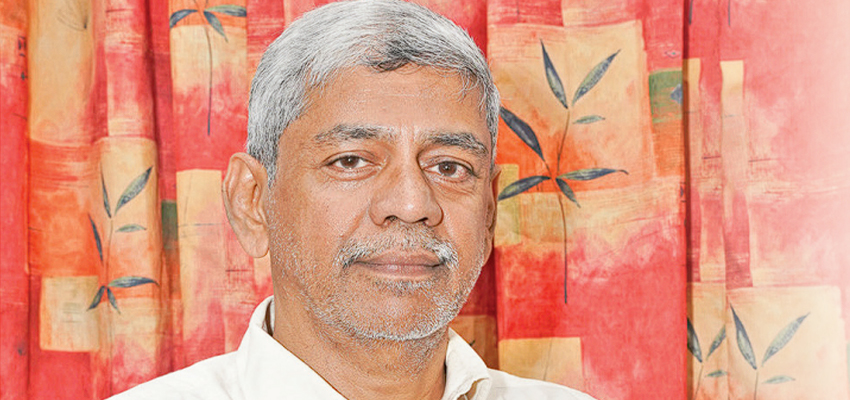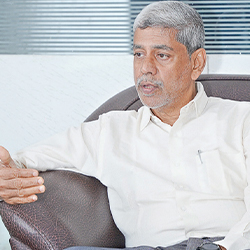First-Gen Entrepreneur

On a seesaw journey in life that taught him to do something beyond the knowhow, K. Vijay Kartha, Chairman and Managing Director, M.E. Energy, took an impulsive decision to leave his job, which led him to discover a completely different path for his life—of a first generation entrepreneur. K. Vijay Kartha has 40+ years of professional experience at different levels in different functions in energy saving and energy cost reduction projects for industries, which helps him to innovate and provide energy solutions to industries. In an exclusive interview with Corporate Citizen, Kartha talked on his journey of starting from the scratch, the importance of family support for growth and more
Definitely, consistency is the key to growth and success. In addition, freedom at work to plan and execute a work also plays major role in growth and success. If people want to do things differently, they should be allowed that freedom this is what makes a big difference at the work place
Innovation is treading a path which others have not taken, to reach the same goal in a better way, faster way, cheaper way. Success is in being nimble and adapting the newer trends faster than your competitors and your contemporaries
Corporate Citizen: You are a mechanical engineer; how did you get on to the entrepreneurial bandwagon?
Vijay Kartha:I completed my mechanical engineering studies in 1978 and got into jobs as any other average Indian would do. I joined Thermax Ltd., in Pune in 1984, after a few stints in various fields. Later, I took a break from Thermax for two years and joined a Tata group engineering company in Jamshedpur. I completed a two year’s parttime management programme at XLRI, Jamshedpur and rejoined Thermax in 1990.
Thermax was still at its initial growth phase at that time and provided a lot of freedom and independence at work, encouraging one to take decisions, to take risks without fear, to experiment, to be creative, to think beyond the normal. Looking back, I realise that these are the major aspects of being an entrepreneur.
I had never thought that I would ever become an entrepreneur. I decided to leave my job with Thermax in 1997, even when I had achieved more than normal growth in a very short span of 10-11 years. I started searching for jobs, when the realisation hit me hard—the industry was not doing so well at that time and job market was very dull.

During this job-search period, I happened to meet two of my former colleagues, who too had left their jobs at Thermax and had been working elsewhere in Pune. A series of discussions and debates ensued and we decided to start something new together. Then, we decided to start a design and engineering consultancy business, for just one reason that it did not entail any capital investments.
Thus, Maxheat Engineering Private Limited was incorporated with an initial investment of around `1 lakh. We rented a small one room kitchen flat, which had a landline telephone connection and bought three steel tables, six chairs and a Panasonic fax machine.
We would sit around the telephone and ring up customers we knew from our past job and inform them about our venture, services offered and seek enquiries. We made gradual progress and our business turnover started growing. However, circumstances changed and one of the partners decided to discontinue and go back to his job. In the meantime, we had commenced manufacturing small thermal equipment for our customers. By this time, the turnover had grown to ` 6 to 7 crores and we realised that we are capable of creating prosperity for ourselves and customers. The second partner thought that the growth in the We would sit around the telephone and ring up customers we knew from our past job and inform them about our venture, services offered and seek enquiries. We made gradual progress and our business turnover started growing. However, circumstances changed and one of the partners decided to discontinue and go back to his job. In the meantime, we had commenced manufacturing small thermal equipment for our customers. By this time, the turnover had grown to ` 6 to 7 crores and we realised that we are capable of creating prosperity for ourselves and customers. The second partner thought that the growth in the business involved too much risks and hence wanted to limit the activities. On the other hand, I was ambitious, I need challenges every day. I need to surpass my own limits on a daily basis. Finally, second partner too decided to part ways with the company. We appointed an international agency to provide us conciliation services and related work for creating an amicable settlement.
By this time, we had ventured into (Thermal) Energy Saving Equipment and Systems. Maxheat Engineering was rechristened as M.E. Energy Pvt. Ltd.—we bought a 10,000 square feet factory in Bhosari, a 3000 Sq. feet office in Kasarwadi, from our own internal accruals. People strength increased to 40-50 and business started growing further
Subsequently, we acquired a larger plot of land and built a matching office and factory in 2009-10. Today, M.E. Energy is a carefully built going-concern, with a strong team of nearly 100 staff, engineers and managers and more than 250 technicians and workmen. We are known to possess sound technical strength and are known for building custom built equipment and systems, suiting to the needs of our customer and end users. Our patrons include blue chip corporations from almost all the industrial sectors in India and more than 20 foreign countries.
So, becoming an entrepreneur was never a plan, it just happened. Life had been great and has taught me a lot in the bargain.
CC: How did your family support when you left the job and started your own business from the scratch?

I strongly believe that a journey like mine can happen with the fullest support of my family. My mother readily blessed me when I informed her that I was starting a business and not searching for a job anymore. I gave whatever money I received from Thermax to my wife and told her that we may have to survive for a few years on this. She would take care of the home, the children and come to the office for a few hours every day in the initial years. She stopped coming to the office regularly, when we shifted the office and factory to Markal, near Alandi. She managed the finances extremely well and even today she is in charge of finances at home.
She too supported me in everything that I wished to do in those days. My children were in their formative years when I started and they certainly missed my attention—what with working 24x7 along with incessant travelling to meet customers.
CC: How do you deal with uncertainties in business and manage work related stress?
When I was in Thermax, I took the path of Yoga and became disciple of Yogi Rishi Prabhakar. Under him, I learnt meditation, Pranayama and physical yoga. A lot of those learnings are rooted in me even now. I have learnt and I am capable of remaining calm and accepting a situation and being in okayness. If it happens, it is okay and if it does not, still it is okay. You can correct it later, next moment, but not this moment. There is no point in crying about it.
Establishing the new factory at Markal in 2009, entailed a lot of recurring and fixed expenses and we were aware of it. But the economic downturn triggered by the fall of Lehman Brothers was bolt from the blue. We went through the toughest financial situations, which lasted for around three years on. We brought in a private equity investor—a US based family, who invested some money into the company for a share in M.E. Energy, which we used to put the company back on track.
This infusion of funds gave us a fresh lease of life and we were in the growth path once again. M.E. Energy was all poised to cross the 100 crores turnover milestone in 2018-2019, when the Covid pandemic hit the world. Major contracts worth ` 70-80 crores were cancelled or stalled for the same reason and we got into a financial tail spin again. Huge losses engulfed us when one of our large customer burst financially and went under the National Company Law Tribunal (NCLT). But we remained firm on our resolve to do our best and came out of the situation. M.E. Energy is doing extremely well once more with a strong and ever growing order book.
CC: You worked for Thermax for over 14 years. Is consistency the key to growth and success, while working in an organisation?
Definitely, consistency is the key to growth and success. In addition, freedom at work to plan and execute a work also plays major role in growth and success. My experience is that when I ask someone what to do, he will do just that. On the contrary, if I tell him/her what is required, they will definitely do more than what is required, probably in a better way. This is what I call freedom at work. If people want to do things differently, they should be allowed that freedom—this is what makes a big difference at the work place. So, I have always been a friendly leader.
CC: What is innovation and why it is important in building your business and career?
Innovation is treading a path which others have not taken, to reach the same goal in a better way, faster way, cheaper way.
CC: You have established yourselves as a force to reckon with in the field of Thermal Engineering, Energy Saving and Management. How do you stay updated with the latest trends in these fields?
We are in touch with what is happening in the world through various channels and media. Google, LinkedIn, YouTube etc. help us to remain abreast with the latest in our industry. At M.E. Energy, we say we are a learning organisation. We give a lot of emphasis to learning on an everyday basis. Success is in being nimble and adapting the newer trends faster than your competitors and your contemporaries.
CC: How do you apply these trends and upgradations in your company?
We take a consultative approach to selling these systems, often meeting and engaging the customer to define the need and conceive the most suitable solution for the applications. Then we custom build and design a system incorporating the latest trends, our learnings and experience. This is a far cry from what many of our competitors do—sell a standard product and leave the pain of adapting this standard product to the solution to the customer.